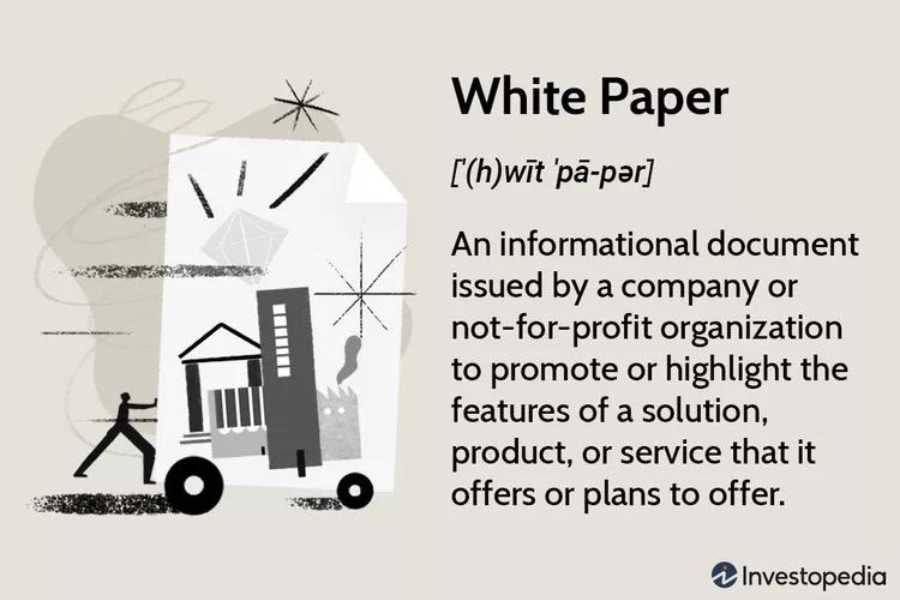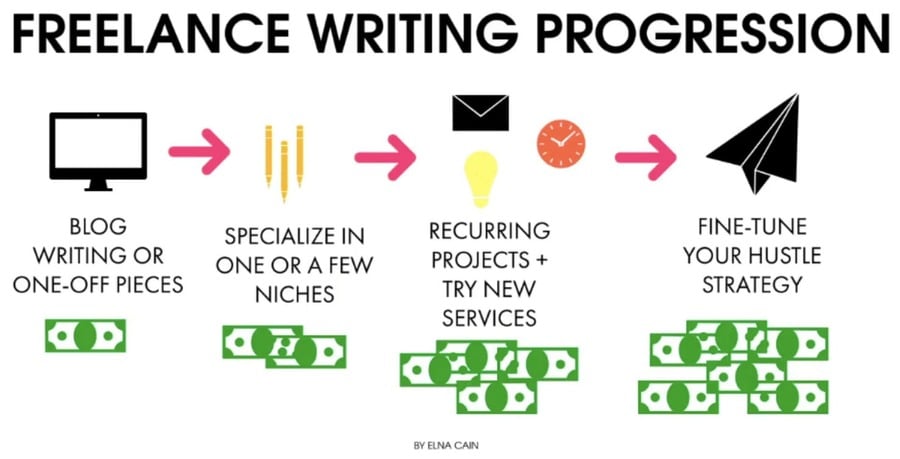Negotiating freelance writing rates is overwhelming.
You love writing but don’t want to be taken advantage of. You need to make a living, but you’re afraid to “rock the boat” when negotiating your pay rate.
When you ask writers the age-old question… “how much money can I make freelancing?” You end up being more confused than you were before.
Everybody has different answers, experiences, and feelings on the subject.
(Spoiler alert, that’s because there isn’t a straightforward answer.)
But maybe you’ve been asking the wrong question. Instead, ask yourself, “How much money am I worth?”
In this post, you’ll find out.
Furthermore, you’ll learn the different ways of being a freelance writer, how much money you can expect to earn, and how your previous experience fits into that equation.
You’ll have confidence in your worth.
Let’s go!

Show Me The Money
Let’s jump right in and check how much you can make as a freelance writer:
- On average, freelance writers earn $24.22/hour.
- At a regular full-time job (40hrs/week), that would earn you close to $50k per year.
Not bad, right?
Let’s break it down and look at a study done by Peak Freelance:
- 91% of writers in their first year make less than $30k.
- 50% of writers have worked 6-10 years to get into the $100k club.
When we look even closer, they found:
- 50% (or more) of freelance writers earn less than $30k per year.
- 18% of freelance writers reported income levels of $31k – $50k.
- 5% reported making between $100k – $125k.
- 4% earned over $125k.
It tells you at least 70% of freelance writers make less than $50k per year, and less than 10% make over $100k.
(To put that into perspective, 50% of freelance writers only work 10hrs/per week.)
That means 20% of writers are making $50k-$100k per year — the sweet spot.
Writers in this income range have figured out a few important things to get them there.
They’ve learned their worth.
How To Set Your Rates For Freelance Writing

So, let’s get to the bottom of this. We’ll look at some rates to help you decide how best to charge clients and help you find that income sweet spot that works for you.
Per-Word Rates
Generally, a freelancer starting out will charge a per-word rate. It’s a wise choice, as it helps you and the client be on the same page.
Let’s say this client is on top of their game and has outlined their desired word count with a reasonable deadline.
There should be no question about how much you’re getting paid and how long it will take.
So, let’s make sure that you’re aware of what the going per-word rate is.
How Much Can You Charge?
These rates are flexible. There are many factors you will want to take into consideration when setting your rates (more on that later).
Here we have a basic breakdown from We Are Indy:
- Entry Level — $.03 to $.06 per word
- Intermediate — $.07 to $.12 per word
- Experienced — $.13 to $.20 per word
- Expert Level — $.21 to $.30 per word
💡Fun facts about per-word rates💡
- $250 – $399 is the most popular rate for a 1500-word blog post.
- 21% of freelancers charge per word.
- 34% of freelancers charge less than $.20 per word.
- 85% of freelancers charge less than $.30 per word.
- 97% of writers that charge per word write blog posts, but not exclusively.
Hourly Rates
Pricing an hourly rate can be tricky for a writer.
Let’s say you’re freelance rates are $20 per hour. That sounds reasonable, but you might not find it sustainable.
As your skills sharpen and your speed increases, you will want to raise your rates.
Yet, it’s hard to justify jumping from $20 per hour to $75 per hour if you’re used to working with a regular client who might not be inclined to pay more.
Many experienced freelancers have learned this lesson the hard way. But luckily, you can learn from their mistakes.
How Much Can You Charge?
Here’s a breakdown to help you gauge your per-hour rate based on your experience level:
- Entry Level — $15 to $30 per hour
- Intermediate — $35 to $60 per hour
- Experienced — $65 to $100 per hour
- Expert Level — $105 to $150 per hour
💡Fun facts about hourly rates💡
- 53% of freelancers with a bachelor’s degree charge $50 – $100+ per hour.
- 3% of freelancers with only a high school diploma charge by the hour.
The data suggests that a writer who specializes in a specific area or has a lot of experience feels more comfortable setting an hourly rate for their skills.
(Check out this handy calculator that converts a yearly salary to an hourly rate.)
Per Project Rates (Flat rate)
Charging a flat rate per project is most popular for writers. It does help if you already have some experience, though, because there are a few things to consider. For example:
- How many hours will it take to complete the project?
- What is the total word count?
- How much research is required?
- What is the scope of the project?
- How complicated is the project?
So, if the majority of writers (97%) content writing for blogs charge per word, you might be wondering:
“What are freelancers writing that isn’t blog content?”
There are many other ways to make money freelancing. Here are a few of the more popular methods.
How Much Can You Charge?
This study from Ashley Cummings provides some great insights into the average costs per project:
- Guides and ebooks — $5500
- Website copy — $3200
- Landing pages — $2175
- Sales letters — $1750
- Ads — $1050
- Case studies — $870
- Blog posts — $550
💡Fun facts about per-project rates💡
- 65% of freelancers choose to charge per project.
- 27% of writers charge between $250-$400 per 1500 word post, and also that:
- Most writers who earn more than $100k per year charge a min. of $1000 per post.
Most freelancers oscillate between writing different types of content using a variety of writing rates specific to each one.
Let’s look closely at some of the more popular niches for which freelancers create content.
Identify Your Niche and Go For It

There’s a ton of work for freelance writers. Most writers start out blogging, but the opportunities are endless.
There’s a niche for every writer. Check out a few popular ones here, and see if any get you excited!
Content Marketing & SEO (Search Engine Optimization) Writing
Content marketing is the planning, creating, and sharing of valuable content. The goal is to attract and convert readers into customers and customers into repeat buyers.
In a nutshell, a content marketer educates the reader and builds trust with them so they will purchase products and services from the business.
Content marketing reaches far into many areas of content creation for freelancers, including:
- Blogs
- Ebooks
- Case studies
- Videos
- Social media
- Podcasts
- Audiobooks
- And so much more.
SEO benefits online searchers using relevant terms or phrases to help them find products, services, information, or a business. These benefits help drive sales, increase traffic, and improve brand awareness.
You can charge:
- $.07 – $.12 per to start with at an intermediate level and then notch your rates up to $.20 — $.30 per word as you sharpen your skills.
- A fair rate for writing a 1500-word blog post is $250 – £399.
Email Marketing
These are primarily short pieces of content you write to help with strategic marketing for online businesses.
Freelance writing capitalizes on assisting online businesses by writing email content for promotions, announcements, onboarding, newsletters, and more.
You can charge:
- $100+ per email.
- $200 – $300 for 4-5 day email sequences.
Businesses that pay big bucks for email marketing are:
- Ecommerce businesses
- Retail
- Hospitality
- Influencers
- Luxury brands
- Wedding Industry
- Etc.
Landing Pages
A landing page is a specific single page that a person will click through via email, advertisement, digital service, etc.
The primary purpose of creating a landing page is to promote marketing and advertising that will attract customers to the next step toward making a purchase.
You can charge:
- $300 — $800 per page, depending on your experience level and the clients budget.
- $5,000 for experienced freelance writers working for a larger business.
White Papers
Simply put, white papers are informational documents.
(Like this one below ⬇️)

The main types of white papers are:
- Backgrounders (An official briefing or handout giving background information.)
- Numbered lists
- Problem/Solution document
White papers are highly sought after by startup companies, large corporations, non-profit organizations, and government agencies.
They are usually approximately 2,500 words long and have a straightforward yet compelling narrative.
You can charge:
- $500 — $1000 for a single white paper.
- $5,000 for larger ones that require more research or interviews.
White papers are very lucrative; some people make over $250k yearly.
Website Copywriting
Sometimes confused with content marketing, website copywriting is for websites to showcase their branding and turn browsers into customers.
Website copywriting includes:
- Home pages
- Services pages
- Contact pages
- About pages
- Etc.
You can charge:
- $1 — $3 per word.
- $60 — $100 per hour.
- $400+ per page at a flat rate.
That was just a snapshot. There are plenty of popular areas in which freelance writers can thrive.
This simple chart from Elna Cain will give you some insight into how to progress your career ⬇️:

Here are some other areas that you can also pursue:
- Advertising.
- Ebooks.
- Press releases.
- Technical writing.
- Ghostwriting.
- Sales letters.
The list goes on.
But this is an excellent start to help you understand all the opportunities and their freelance writing rate.
You just need to dive in and build up your experience level one step at a time.
Why Your Experience Is An Asset
Experience matters.
It helps you build trust with prospective clients and gives you confidence in your skills to understand their goals, deadlines, and budget.
The more experience you have freelancing, the better you become at producing quality content.
That means less work on the backend for your client spent editing and formatting your work.
It helps to justify your freelance writing rates.
Assess Your Experience Level:
If you’re a beginner or an experienced writer, here are a few questions to consider when setting your rates…
Do You Have Experience in a Particular Niche?

Expertise in a specific niche isn’t necessary for being a content writer but can be helpful when approaching a potential client. As your experience grows, so will your writing skills and the diversity of your niches.
If you’re new and need to find your niche, consider what you’re interested in thinking, writing, talking about, and learning. Or pull from your work experience and current interests.
Here are a few examples:
- If you’ve worked as a baker at a local bakery, you’ll have valuable knowledge applicable to content writing for a food blog.
- Let’s say you love being up to date on what the best headphones are and why. You’ll probably have luck writing an electronics blog post.
Explore two or three niches as your content type, and start writing.
How Many Years Have You Been Writing?
Every writer has their own unique life experiences and natural aptitudes. If you’ve been writing professionally for 6+ years, you’ll have gained a stronger relationship with your writing, and charging higher rates will be acceptable to clients.
If you’re a newbie writer, you might be overwhelmed just trying to figure out how to find a prospective client.
Yet, if you’re insecure about your level of writing experience, it might interest you to know how your previous education is an asset.
What Is Your Highest Level of Education?
Education can make a difference in your rates as a writer for a few reasons:
If you have a degree in, let’s say, business and you’re interested in freelance writing for financial blogs, your education will come in handy.
People with a post-secondary degree generally have a higher aptitude for research, writing papers, and meeting deadlines.
Moreover, a whopping majority of freelance writers (76%) have a bachelor’s degree or higher. People with only a high school education are less likely to pursue a freelancing career.
But don’t let these stats dissuade you.
A client wants to work with curious people who continue learning, are great to work with, and deliver quality content.
Plan Today, Thrive Tomorrow
I’m sure you’re worth a million bucks, but don’t bite off more than you can chew.
In the beginning, freelance writing can be a grind. It’s a balancing act between finding work, making a great income, and trying not to burn out while doing it.
You don’t want to make the mistake of undercharging and overworking yourself.
Remember, you’re running a freelance writing business.
Here’s a freelancer checklist of things you can circle back to as you move forward and plan your future freelance writer rates.
What Are Your Overhead Costs?

- Location
- Expenses
- Benefits
What Are Your Income Goals?
- Plan your income goals
- Preferred Pricing Model
- Unique skills you offer a client
- Experience
- Speed to quality content ratio
- Project scope you’re comfortable with
How Can You Level Up Your Freelance Writing Rates?
- Expand your content writing experience.
- Clients’ testimonials help take beginner writers to expert writers.
- Write for respected companies.
- Showcase your portfolio on your website.
- Incorporate higher-paying clients.
- Set profit goals
- Step away from beginner gigs and into projects that will level up your income.
- Avoid burnout.
Make Friends With Your Freelance Writing Rates
You and your freelance writing rates are becoming fast friends already. You’ve learned to apply them to profitable niches and incorporate them into your business plan.
Everybody’s path is different, and it sure helps to know where you’ve been, where you’re going, and how to get there.
You’re well on your way.
Negotiating a higher rate with a client is liberating. If your reasoning is sound, you’re not taking advantage of them, and they’re not taking advantage of you.
When you know your worth, everybody wins!




